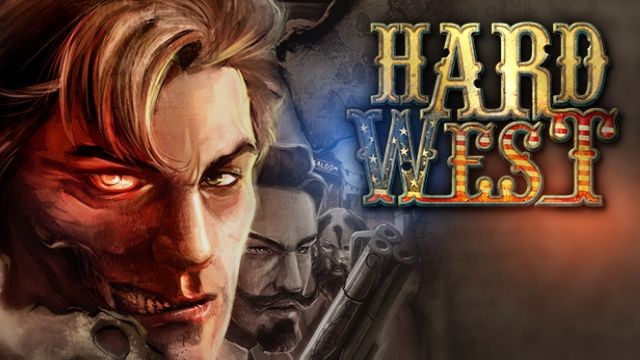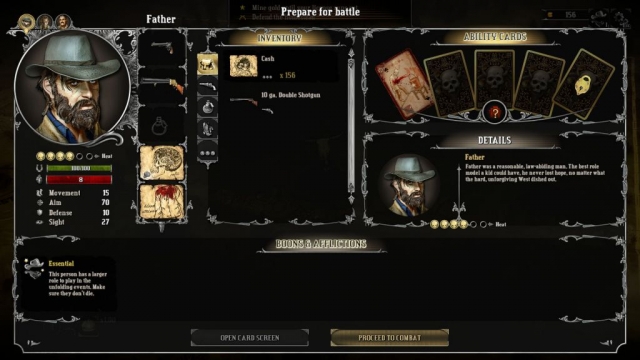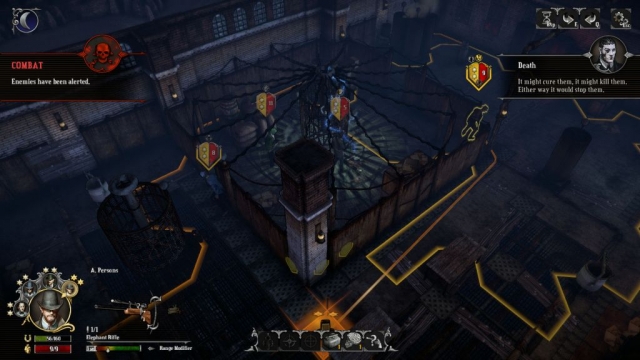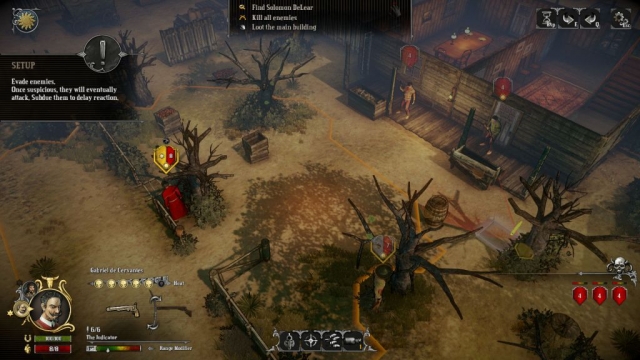Hard West

Hard West is a new tactical strategy title from CreativeForge Games. It takes place in the “Weird West,” which is an imagining of what the Old West would have been like if the devil had been a major player. The game starts out with a small family heading west to Oregon. Their trip is uneventful until disaster strikes: the mother is kidnapped and killed by bandits, and the father and son get separated while seeking revenge. The campaign then follows the father and son, while also taking time to explain how the bandits came to power and how the devil was summoned from hell.
The campaign for Hard West isn’t like what you usually see from a tactical strategy game. It doesn’t follow a linear sequence of maps, where your goal in each map is simply to kill everybody while possibly fulfilling some other objectives. Instead, each of Hard West’s eight scenarios is sort of like its own game, complete with its own set of rules. You’re given a map of the region with a dozen or so locations to visit, and you’re also given a variety of tasks to complete.
As an example, in the first scenario your goal is to raise money. Conveniently enough, gold was just discovered in the region. So in several of the locations, you can try your luck with a handful of different mining strategies, each with a cost and payout possibility. At other locations, you can hire a miner to join your crew, or visit your neighbors to see how they’re doing, or go shopping for new weapons and equipment. You also have to deal with the bandits, who become more aggressive with the more money you have, and so there are also locations where you have to attack or defend the site.
The objectives for the other scenarios include things like killing so many people and causing so much damage that the bandits have to take notice of you, searching for a cure for a mysterious disease before succumbing to it yourself, searching for people while keeping enough provisions that you don’t starve, and more. The scenarios are generally creative and interesting.
Another nice thing about the scenarios is that you’re given some choices in them. Mostly this has to do with whether you’re violent or not, but you can also choose your companions, make deals with the devil (or not), and absorb power (or not). There are also at least two ways that the game can end, and so the scenarios have some replay value. Moreover, depending upon how you play, you can unlock up to three items per scenario, and these items then become available for sale (from “fate traders”) in the other scenarios.
During each scenario you control a “posse” of up to four characters. These characters don’t gain experience or levels, but you can tune them through the equipment they wear. Each character can equip five items — two guns, two consumables, and one talisman — and they can also carry up to five cards. The guns come in a variety of shapes and sizes, from the lowly derringer to an “eighteen shooter” pistol to a sniper rifle. Consumables can be healing medicines, buffing drinks, or bombs. And talismans give a fixed bonus, with examples including improved defense, better aim, or increased damage.
But the most interesting items are the cards. Each card gives you a small passive bonus based on its value, plus an extra passive or active ability that you can use during combat. So all jacks, for example, add +2 defense, but the jack of diamonds also allows you to regenerate health, provided you’re not standing in direct sunlight. Moreover, you also get a bonus for the hand you’re holding. A simple pair allows you to move farther each turn, while a royal flush gives you a sizeable boost to your maximum health. I liked the idea of the cards, especially since they fit in well with the setting of the game.
Combat in Hard West proceeds in turns. When it’s your turn, you can perform actions for all of your characters. Each character gets 2 action points, which they can spend on things like moving, firing their gun, or using an ability. For most guns, firing it uses up the shooter’s action points, so characters can only fire once per turn (some smaller guns, like the derringer, can fire twice). Characters can also hide behind full cover or half cover to reduce the amount of damage they take from enemy shots.
For me, the combat felt a little ho hum. Cover is way too powerful. Characters in full cover rarely take more than 1 damage, so your best course of action is to find a good defensive position and then snipe at the enemy. If your characters have the right cards (which give healing each round) then it’s almost impossible to get defeated this way. I was also disappointed in the abilities. Abilities require luck to use, but luck is also a defensive stat. Characters start with around 100 luck, and the luckier they are, the less likely they are to get hit. But each miss reduces their luck (while each hit replenishes it), so they rarely have enough luck to do anything other than move and fire their gun.
The enemy AI is also a little lacking. Enemies don’t always take advantage of cover (or they use the wrong cover), and they’re too easy to “trick.” If enemies can’t see you, then they come looking for you. So on your turn you can hide your characters, and after enemies leave their cover to pursue you, you can move your characters back to their firing positions and let loose a barrage at the exposed enemies. That will probably kill them, but even if it doesn’t you can just repeat as necessary.
Another possible issue with Hard West is the save system. CreativeForge wants you to live with your decisions, and so you’re not allowed to save your game. You’re only given autosaves — one for your campaign progress, and one for your current scenario. There aren’t even profiles or anything, to allow multiple people to play the game. In some ways I can understand why CreativeForge did this. For example, in the first scenario, you find a wishing well, and you can either toss some money into it or climb down and steal what’s there. If you can save first, then you can figure out which answer is “best,” but with only autosaves, you have to be more careful. Still, I hate it when I don’t control when the game is saved, and the lack of profiles (or any way to reset the campaign for new players) is annoying.
Overall, I didn’t like Hard West as much as I thought I would. The campaign is interesting, but developer CreativeForge spent so much time on “flashback” scenarios that it was difficult for me to connect with anybody or care what happened. And the combat engine, which should be the highlight of the game, is sort of basic and lackluster, and it ends up being more of a negative than a positive. To that, add things like the game’s grim tone (with its narration by Death in a monotone voice) and its unfriendly save system, and Hard West isn’t really a game I’d recommend — except for the fact that it’s different and pretty cheap, and so it’s something you might want to take a chance on at some point, just to see if it works better for you than it did for me.
Reviewed By: Steven Carter
Publisher: Gambitious Digital Entertainment
Rating: 68%
——————————————————————————–
This review is based on a digital copy of Hard West for the PC provided by Gambitious Digital Entertainment.
 Game Over Online
Game Over Online











